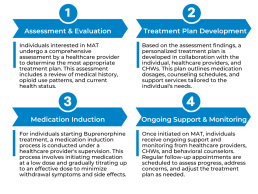You Don't Have to Do It Alone
Reach Out is here to assist you!
Sign up for MAT to receive treatment today!

INITIATE THE PATH TO RECOVERY — SEEK SUPPORT
Medication Assisted Treatment (MAT)
Medication-Assisted Treatment, or (MAT) is an evidence-based approach to treating opioid use disorder (OUD). It involves FDA-approved medication, along with counseling and behavioral therapies, to provide a comprehensive treatment approach for individuals struggling with dependency.
Key Components of MAT
Medication
Buprenorphine is the medication that the program uses to help reduce cravings and withdrawal symptoms associated with opioid use disorder.
Support
Community Health Workers (CHWs) play a crucial role as navigators through connecting individuals with OUD to resources and support services within their community.
Counseling
Counseling and behavioral therapy are essential components — they help individuals address the underlying causes of their dependency, develop coping skills, and make positive lifestyle changes.
Medical Oversight
Medical professionals provide medical oversight and prescribe Buprenorphine — they monitor patients’ progress, adjust medication dosage, and ensure the safety and effectiveness of treatment.
Benefits of MAT
Reduced risk of overdose and death
Improved retention in treatment program
Reduced cravings and withdrawal symptoms
Increased ability to focus on recovery and rebuild
Lower rates of relapse and re-hospitalization
Getting Started with MAT

Frequently Asked Questions
MAT medications can have side effects, typically mild compared to risks associated with ongoing opioid use. Common side effects may include nausea, constipation, or sleep disturbances.
MAT has been shown to significantly reduce the risk of relapse and overdose. It helps individuals stay engaged in treatment and provides a buffer against cravings and withdrawals.
Counseling or therapy is a crucial component of MAT. It helps individuals address the psychological aspects of addiction, learn coping skills, and make behavioral changes that support recovery.
Many insurance plans, including Medicaid, cover MAT. Coverage can vary, so it is essential to check with your insurance provider or treatment facility for specific details. We can provide insurance assistance at the providers’ offices.
MAT is typically recommended for individuals experiencing opioid use disorder (OUD), including those addicted to prescription opioids or synthetic opioids like fentanyl.
The duration of MAT varies from person to person. Some may benefit from short-term MAT to manage withdrawal, while others may need long-term maintenance treatment. The decision should be based on individual needs and recovery progress.

